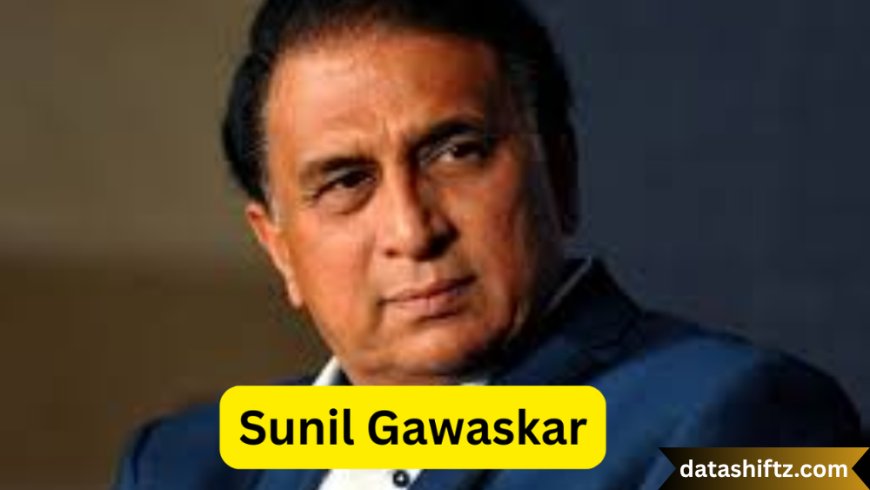Sunil Gavaskar: The Little Master Who Redefined Indian Cricket

Introduction
In the grand tapestry of Indian cricket, Sunil Manohar Gavaskar occupies a legendary space. Widely known as the Little Master, Gavaskar was the first Indian batsman to achieve international stardom and redefine what was possible for Indian cricket on the world stage. He wasn’t just a skilled batsman—he was a symbol of resilience, technique, and class in an era dominated by fast bowling and foreign pitches.
This article offers a comprehensive exploration of Sunil Gavaskar’s career, his achievements, impact, and legacy—presented with historical insight, data tables, and useful breakdowns for cricket enthusiasts.
Early Life and Background
Childhood and Introduction to Cricket
Born on 10th July 1949 in Mumbai (then Bombay), Sunil Gavaskar hailed from a middle-class Marathi family with a deep love for sports. His uncle, Madhav Mantri, played Test cricket for India, and Gavaskar grew up idolizing him.
A keen observer of the game from a young age, Gavaskar’s cricketing journey began at St. Xavier’s High School, where he displayed outstanding talent. He quickly rose through the ranks and made his first-class debut for Bombay in 1966–67.
International Cricket Career
Test Debut and Dream Series
Sunil Gavaskar made his Test debut in March 1971 against the West Indies in Port of Spain. In that very series, he scored an astonishing 774 runs in 4 matches, still a record for a debut series. It was the beginning of a long and decorated international career.
Career Highlights
-
Test Career: 125 matches, 10,122 runs, 34 centuries, 45 fifties
-
ODI Career: 108 matches, 3,092 runs, 1 century, 27 fifties
-
First Indian to score 10,000 Test runs
-
Held the record for most Test centuries (34) for nearly two decades
-
Captain of India in several Test matches between 1976–1985
Statistical Overview of Sunil Gavaskar’s Career
Sunil Gavaskar Career Stats
| Format | Matches | Runs | Average | 100s | 50s | High Score |
|---|---|---|---|---|---|---|
| Test | 125 | 10,122 | 51.12 | 34 | 45 | 236* |
| ODI | 108 | 3,092 | 35.13 | 1 | 27 | 103* |
| First-Class | 348 | 25,834 | 51.46 | 81 | 105 | 340 |
| List A | 151 | 4,966 | 36.09 | 6 | 35 | 123 |
Impact on Indian Cricket
Breaking the Colonial Complex
Before Gavaskar, Indian cricket was often seen as weak on foreign soil. Gavaskar’s performances, especially against hostile fast bowling attacks in England, Australia, and the West Indies, gave India self-belief and international recognition.
Master of Technique
Gavaskar’s batting was built on an almost mathematical technique—perfect footwork, compact defense, and ability to leave the ball. His performance on fast, bouncy pitches revolutionized Indian batsmanship.
Role in India’s 1983 World Cup Win
Although not a key scorer in the 1983 World Cup, Gavaskar’s presence in the team added experience and strategic leadership. India’s unexpected triumph added another golden chapter to his legacy.
List of Sunil Gavaskar’s Most Iconic Innings
-
124 vs West Indies – Bridgetown, 1971
-
221 vs England – The Oval, 1979
-
236 vs West Indies* – Chennai, 1983
-
96 vs Pakistan – Bangalore, 1987 (his final Test innings)
-
103 vs New Zealand* – Nagpur, 1987 (his only ODI century)
These innings are remembered not just for their runs but for the contexts—hostile bowling, collapsing lineups, and immense pressure.
Captaincy and Leadership
Gavaskar was named India’s captain in 1976, and although his stint was not without controversy, he led India in:
-
47 Tests (Won: 9, Lost: 8, Drawn: 30)
-
ODI captaincy in multiple short stints
Though criticized for being conservative as a captain, Gavaskar brought stability and discipline to the team, essential in an era of volatile selection and performance.
Life Beyond Cricket
Commentary and Writing
Post-retirement, Gavaskar turned to commentary and cricket analysis, quickly becoming a respected voice in the media. His sharp wit and detailed understanding of the game made him a household name on TV.
He also authored several books including:
-
Sunny Days (autobiography)
-
Runs 'n Ruins
-
One Day Wonders
-
Idols
Roles and Recognition
-
Served as ICC match referee
-
Part of the BCCI Advisory Committee
-
Played a role in player selection reforms
Honors and Awards
Major Awards Won by Sunil Gavaskar
-
Padma Bhushan (1980)
-
Padma Shri (1975)
-
Wisden Cricketer of the Year (1971)
-
Col CK Nayudu Lifetime Achievement Award (1996)
-
ICC Hall of Fame Inductee (2009)
-
First recipient of the Border-Gavaskar Trophy name dedication
These honors are a testament to his contributions both on and off the field.
Legacy and Influence
Sunil Gavaskar changed the narrative of Indian cricket. He showed that Indian batsmen could not only compete with the best, but dominate on foreign pitches. His self-belief influenced generations—from Sachin Tendulkar to Virat Kohli—and made cricket not just a game, but a national emotion.
His methodical and calm approach was a blueprint for professionalism and discipline in sports.
Gavaskar vs Modern-Day Legends
Gavaskar Compared with Modern Greats
| Player | Matches (Test) | Runs | 100s | Era Played |
|---|---|---|---|---|
| Sunil Gavaskar | 125 | 10,122 | 34 | 1971–1987 |
| Sachin Tendulkar | 200 | 15,921 | 51 | 1989–2013 |
| Rahul Dravid | 164 | 13,288 | 36 | 1996–2012 |
| Virat Kohli | 113 (ongoing) | 8848 | 29 | 2011–present |
Criticisms and Controversies
Even icons are not immune to scrutiny. Gavaskar faced criticism for:
-
Defensive captaincy
-
Selective media remarks
-
Comments on fellow cricketers or cricket boards
However, none of these ever significantly diminished his stature as one of the greatest cricketers of all time.
Conclusion
Sunil Gavaskar’s name is etched in golden letters in the annals of cricketing history. As a pioneer, trailblazer, and master technician, he inspired not only a generation of cricketers but also a billion Indians who saw hope and heroism in his courage against fearsome bowlers.
From the dusty maidans of Mumbai to packed stadiums across the globe, Gavaskar showed that class, determination, and skill could overcome the fiercest of challenges. His career remains a cornerstone in Indian cricket's transition from underdogs to world champions.





























